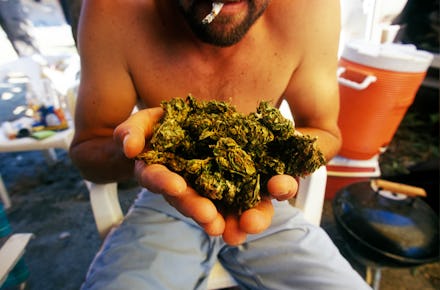3 Months After Marijuana Legalization, Here's What's Happening to Mexican Drug Cartels

Let's face it: This is the year of marijuana.
Fifty-eight percent of Americans approve of full legalization, President Obama admitted that it's no more dangerous than alcohol, and Colorado and Washington have made it completely legal to smoke and buy weed. This is a plus for cannabis enthusiasts and local governments — especially since marijuana profits are through the roof. But the spreading decriminalization of pot in the U.S. is crippling some groups: Mexican cartels.
How? Just look at Colorado. On Jan. 1, the state made $1 million on its first day of sales after legalization. In March, the state Department of Revenue reported that retailers made $19 million in pot sales. That's a ton of people who have stopped calling their local dealers for black market weed. There's no need anymore, because now anyone can walk into a store and legally buy an award-winning strain like Chem Tange by La Conte's North.
Black market marijuana used to come into the U.S. from Mexico by way of Arizona and South Texas and end up in the hands of local distributors to sell.
Image Credit: U.S. Department of Justice National Drug Intelligence Center
Yet over the past five years, wholesale drug prices are down from $100 per kilogram to a measly $25, according to the Washington Post.
It is not only the cartels that are taking notice of the decline in price, but farmers in Mexico are now growing other crops in order to sustain themselves, leaving pot by the wayside. Rodrigo Silla, a longtime cannabis farmer for one of the cartels, explained that growing cannabis plants is "not worth it anymore." He told the Washington Post, "I wish the Americans would stop with this legalization." Mexican cartels are having trouble competing with legal weed.
Image Credit: Getty
What are these drug farmers growing instead? Heroin. Farmers aren't just sitting back and resigning themselves to failure. They're drastically changing their growing habits. Authorities are seeing a dramatic number of poppy farms popping up, replacing what used to be marijuana farms. Consequently, the cartels are transporting lots of heroin north from Mexico into the U.S.
Prescription painkillers are still the most widely used drug in the U.S.; however, drug officials are reporting a surge in heroin traffic and use. Wholesale opium sap, which is used to make heroin, doubled in price this year from last year, and is currently being sold in certain Mexican regions for $1,500. Therefore, the sale of heroin is proving to be a more profitable venture for the farmers and the cartels. Farmers like Silla are planting more and more opium poppies, looking forward to money-making harvests in the future.
Heroin is easy to transport and cheap, which can be linked to the 79% increase in usage between 2007 and 2012, according to federal data. In a recent report, the drug is cited as the most used drug in several states, including Illinois, Massachusetts, New Jersey, New York, Pennsylvania and Rhode Island, just to name a few.
Image Credit: U.S. Department of Justice National Drug Intelligence Center
Some background on who's who. The country's most prominent cartels include Sinaloa, Gulf, La Familia, Tijuana, Los Zetas, Juarez and Knights Templar. There is a long history of documented brutality and violence within Mexico's borders, oftentimes at the behest of one or multiple cartel bosses. Drug-related violence led to the death of tens of thousands of people over the past seven years, according to the BBC.
The Sinaloa cartel controls most of the heroin traffic in the U.S. The Sinaloa name had quite a bit of notoriety when "El Chapo," or Joaquín Guzmán Loera, was finally captured in February 2014 after evading law enforcement since 2001. Guzmán served as the Sinaloa boss, and the U.S. Treasury Department dubbed him "the world's most powerful drug trafficker." (After Osama bin Laden was killed, Guzmán became the most wanted man on the planet.) Unfortunately, cartel dynamics and operations have not changed much since the arrest.
The Mexican cartels are definitely taking it upon themselves to diversify in the black market drug industry. They've lost out on some capital from aspects of the recent cannabis legalization in several U.S. states, but they are betting big on emerging and growing poppy farms. Sadly, that means that the decriminalization of weed is indirectly paving the way for a much more dangerous drug inside U.S. borders.